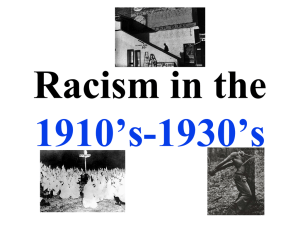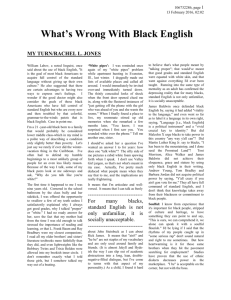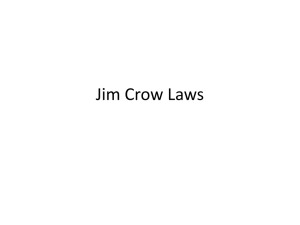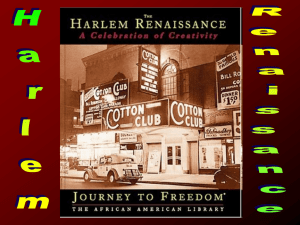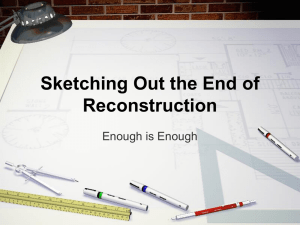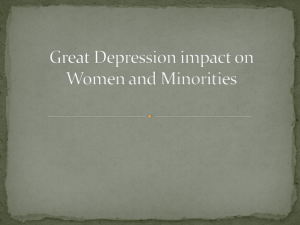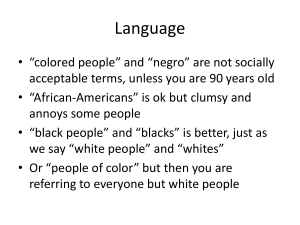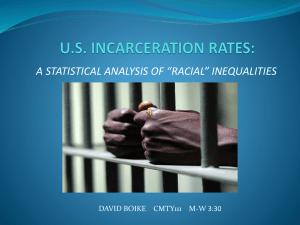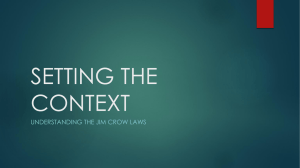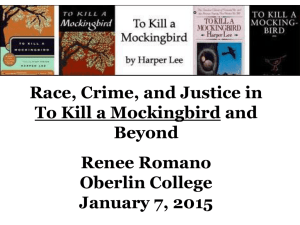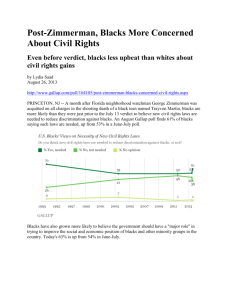1. Jim Crow Laws: Its History, Guiding Policies and Impact on Blacks
advertisement
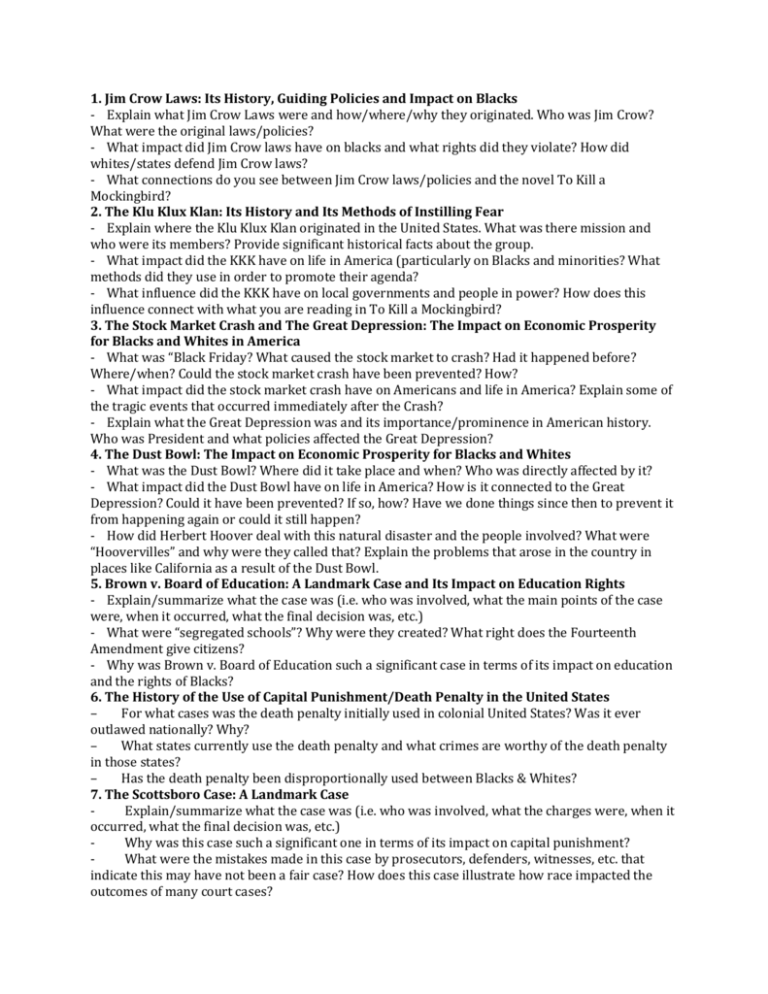
1. Jim Crow Laws: Its History, Guiding Policies and Impact on Blacks - Explain what Jim Crow Laws were and how/where/why they originated. Who was Jim Crow? What were the original laws/policies? - What impact did Jim Crow laws have on blacks and what rights did they violate? How did whites/states defend Jim Crow laws? - What connections do you see between Jim Crow laws/policies and the novel To Kill a Mockingbird? 2. The Klu Klux Klan: Its History and Its Methods of Instilling Fear - Explain where the Klu Klux Klan originated in the United States. What was there mission and who were its members? Provide significant historical facts about the group. - What impact did the KKK have on life in America (particularly on Blacks and minorities? What methods did they use in order to promote their agenda? - What influence did the KKK have on local governments and people in power? How does this influence connect with what you are reading in To Kill a Mockingbird? 3. The Stock Market Crash and The Great Depression: The Impact on Economic Prosperity for Blacks and Whites in America - What was “Black Friday? What caused the stock market to crash? Had it happened before? Where/when? Could the stock market crash have been prevented? How? - What impact did the stock market crash have on Americans and life in America? Explain some of the tragic events that occurred immediately after the Crash? - Explain what the Great Depression was and its importance/prominence in American history. Who was President and what policies affected the Great Depression? 4. The Dust Bowl: The Impact on Economic Prosperity for Blacks and Whites - What was the Dust Bowl? Where did it take place and when? Who was directly affected by it? - What impact did the Dust Bowl have on life in America? How is it connected to the Great Depression? Could it have been prevented? If so, how? Have we done things since then to prevent it from happening again or could it still happen? - How did Herbert Hoover deal with this natural disaster and the people involved? What were “Hoovervilles” and why were they called that? Explain the problems that arose in the country in places like California as a result of the Dust Bowl. 5. Brown v. Board of Education: A Landmark Case and Its Impact on Education Rights - Explain/summarize what the case was (i.e. who was involved, what the main points of the case were, when it occurred, what the final decision was, etc.) - What were “segregated schools”? Why were they created? What right does the Fourteenth Amendment give citizens? - Why was Brown v. Board of Education such a significant case in terms of its impact on education and the rights of Blacks? 6. The History of the Use of Capital Punishment/Death Penalty in the United States – For what cases was the death penalty initially used in colonial United States? Was it ever outlawed nationally? Why? – What states currently use the death penalty and what crimes are worthy of the death penalty in those states? – Has the death penalty been disproportionally used between Blacks & Whites? 7. The Scottsboro Case: A Landmark Case Explain/summarize what the case was (i.e. who was involved, what the charges were, when it occurred, what the final decision was, etc.) Why was this case such a significant one in terms of its impact on capital punishment? What were the mistakes made in this case by prosecutors, defenders, witnesses, etc. that indicate this may have not been a fair case? How does this case illustrate how race impacted the outcomes of many court cases? 8. The Fairness of Capital Punishment: Under the Eighth Amendment, is the death penalty cruel and unusual punishment? Summarize the major points of the amendment and explain the rights it ensures/protects for every individual charged with a crime. Under the amendment, how can capital punishment be viewed as cruel and unusual punishment? How is it viewed as falling outside this amendment, and, therefore, still used by certain states? What are some of the major obstacles that come up in a death penalty case that makes them complicated instead of clear cut? 9. The Harlem Renaissance: The Rebirth of Black Arts and Culture in the North - What was the Harlem Renaissance? Where did it occur and who/what did it involve? Name some major people/results of it? - How did the Harlem Renaissance change life for blacks in America? Can we still see evidence of it in America today? If so, how/where? - Does it go against what many people in America believed about Blacks at the time/today? If so how? - How did the Harlem Renaissance affect the politics of the decades leading up to the Civil Rights Movement of the 1950s and 60s? 10. Harper Lee Biography: How her life connected to story she wrote - Provide a clear biographical profile of Harper Lee both as a person and as a writer. What are some myths about Harper Lee that exist that are not true? - How did her childhood and upbringing influence her writing of this novel? What major characters, elements of its setting and plot emerge directly from real experiences in her childhood? - What connections did Harper Lee have to the Civil Rights movement? Was she trying to make some political/social statements with this book? If so, what were those statements? What impact has her book had on American culture? 11. Role of Women in 1930s South and Women Characters in To Kill a Mockingbird - What was the typical role of women in the South in 1930s America? What limited rights did they have and/or what were they expected to be in the South at this time? - The character of Aunt Alexandra in the book To Kill a Mockingbird is oftent thought of as a “proper” Southern lady. Based on your research, what was a “proper” woman of the South supposed to be like? What was the “social code” she was trying to uphold in the South. Look for descriptions of clothing, behavior, personality, and social roles. - The character of Miss Maudie, the main character’s neighbor, is considered by many to be a woman who defied the typical role of women in the South. Based on your research, what would a woman be doing and behaving like that would be considered “improper” or “breaking the code” of a Southern lady. Are there any examples in history of such women? Who were they and what did they do to break the code? 12. Civil Rights Defenders for Blacks: Atticus Finch as a Reflection - Who were some of the key historical civil rights defenders during the real Civil Rights movement in America? What ideas were they trying to promote and what support did they get? - What did white people who fought to defend the rights of blacks face in terms of hate and violence? Are their historical accounts of white defenders of blacks who faced the hate and violence? - Based on historical accounts and opinions in research, have all Black people looked at white characters like Atticus positively? Do some have negative perceptions of him as a character? Explain why.
